Psoriasis is a chronic, non-infectious inflammatory skin lesion that has a negative impact on a patient's quality of life ("Psora" from Greek - psoriasis). It is that word that, like many other diseases, the first observations of psoriasis are described. This term was coined by Galen, one of the key researchers in medicine.
The skin signs of psoriasis created confusion between people and doctors, as the disease was widespread at the time, with serious consequences. Psoriasis patients suffer from social pressure, they are shunned, isolated. In Europe, such people were forced to warn others of their arrival by ringing a bell. Treatment attempts included the use of feces, onions, sea salt, oil, and urine, but all were ineffective and abandoned the patient with psoriasis.
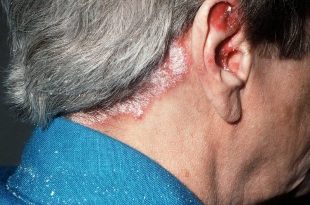
PSORIASIS PRECAUTIONS
The disease can be found at any age, but it is common between 49 and 69 years old. The reported incidence of psoriasis in the countries ranges between 0. 9% and 11. 4%, making psoriasis a serious global problem.
Although there is a common misconception that psoriasis is not as serious as other skin conditions, psoriasis creates a disease burden that goes beyond dermatological symptoms. Its psychological effects are similar to those of cancer, heart disease, and diabetes. Psoriasis patches are often easy to see, which can negatively affect interpersonal relationships, and be successful at school or work. It is not surprising that people with psoriasis have a higher rate of depression with an increasing number of suicidal intentions.
Patients with psoriasis are also at risk of developing serious comorbidities that complicate disease control and increase the risk of premature death. Cardiovascular disease and metabolic syndrome are more common in patients with psoriasis.
Additionally, psoriasis itself is a risk factor for cardiovascular disease, tripling the relative risk of developing a heart attack. Severe psoriasis is also associated with an increased risk of death, leading to a reduction in the life expectancy of men and women by 3, 5, and 4, 4 years, respectively, compared with those without psoriasis.
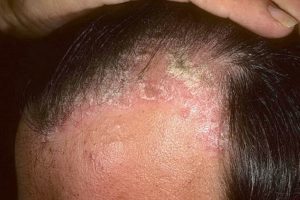
THE CAUSE OF THE FIRST CAUSE
There have been many theories about the origin of psoriasis. This is the effect of bacteria, viruses, allergies, poor hygiene, blood supply disorders to the skin, disruption of the functional balance of internal organs, and one of the most pressing things at the moment. is the autoimmune nature of the disease, when human immune cells attack their own tissues. And even this theory is only a hypothesis, as so far no harmful antibodies to the skin have been found in patients with psoriasis.
At the moment, the cause of the condition is still unknown. But over the course of the study, scientists have identified factors that, with a certain degree of probability, can cause psoriasis.
The following points are distinguished:
- Heredity. There is no one hundred percent chance that even if a parent is sick, their child will necessarily develop psoriasis. But in such situations, the risk of such a pathology is higher. It has also been noted that if one of the identical twins is sick, the second twin is more likely to get the disease than the usual risk in the population. This proves that this nosology has a genetic background.
- Skin damage: accidentally cut by a knife, scratched by a cat, mosquito bites, or sunburn increases the risk of another outbreak.
- Infections: staphylococci, streptococci and other infections can also act as pathogens. Children often develop streptococcal tonsillitis before the onset of psoriasis on the skin.
- There are drugs that can cause illness, such as anti-malarial drugs, some antidepressants.
- Changing your HIV status to positive can also motivate the development of psoriasis. Therefore, HIV testing when it is suspected that psoriasis is no stranger.
- Tension. The most famous trigger among lay people. "It's all about stress" - every psoriasis patient has heard the phrase at least once. Some people are skeptical about this phrase, but it has its own reasons. Scientists believe our immune systems can respond to emotional and emotional stresses as well as physical deficiencies such as trauma and infection.
- Excess weight systematically negatively affects the whole body, and if an obese person has a history of psoriasis, treatment is more difficult and often less effective.
- Smoking. For a long time, it has been noted and made no secret that tobacco has bad effects on skin conditions. It is therefore capable of causing psoriasis, especially damaged head and hands.
- Alcohol is one of the most common causes of psoriasis.
- Hormonal changes. The disease usually manifests itself in puberty. Menopause can also cause psoriasis, but during pregnancy, a decrease or even complete loss of plaques is noticed.
SIGNATURE OF FIRST VIOLATION
In 50% of cases, psoriasis is felt on its own from the start. Psoriasis can appear anywhere on the head. Sometimes small patches grow easily hidden in the hair, but when covering the entire scalp, it is difficult to hide the patches.
The appearance of psoriasis on the head will manifest itself as follows:
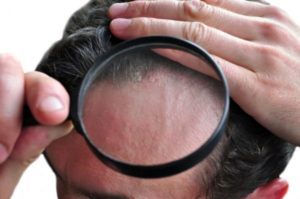
- Red spots on the scalp. Some spots may be blurred because they are blurred, but there are also bright red elements that are easy to see.
- Scaly, flaky skin on a psoriatic skin. The scalp condition in this pathology can resemble conventional dandruff. But there are differences, for example, with psoriasis, silver sheen is observed, and it can also be accompanied by itchy skin.
- Dry scalp. The scalp can become dry, chapped and bleed, which will facilitate further infection, and it can be difficult to treat in such locations.
- Itching. This is one of the most common symptoms. Some people suffer from mild itchiness, patients can forget during daily activities, others have severe itching to the point of working, studying, or even sleeping.
- Bleeding. Because scalp psoriasis can be itchy, the sufferer can scratch and damage the skin. In addition to bleeding, scratching can aggravate the psoriasis process by making the plaque larger and denser. This is why dermatologists tell their patients, "Try not to hurt the scalp. "
- Burning. Patients may describe their scalp literally as "burning".
- Hair loss. Scratching the scalp, using force to remove the flakes, can lead to hair loss. This phenomenon, although temporary, can still cause inconveniences for the patient.
These clinical manifestations can be rapid, rising and falling. This is an individual process. In one patient, the entire pathological process will end up on a pale patch under the hair, while the other patient will have multiple patches of light all over the head. This is affected by, among other things, the triggers described above.
Some problems the patient may face:
- Skin manifestations can be seen by others. Living with psoriasis can be embarrassing. Any aspect of social life can be stressful for these people, such as holding hands on a date.
- Finance. Treatment of psoriasis can be expensive. This is especially true when psoriasis spreads against conventional therapy, in which new drugs based on monoclonal antibodies are used.
- Pain. Chronic pain can occur with psoriasis, increasing stress levels even further. This is especially true when skin manifestations are combined with arthritis, while also decreasing a person's daily activities.
- Healing. Especially when patients seek help late, some procedures do not work as expected, which naturally causes anxiety and mental depression. Other procedures may take a long time. For example, you may need to be lit 3 times a week for up to a year. For some, such a mode will be difficult to adapt to a standard lifestyle.
- Living with a chronic illness. Psoriasis, like many other chronic conditions, requires enormous efforts. It is very difficult for a patient, especially in an early stage, to deal with some of his additional "falling head" problems. This allows depression to emerge.
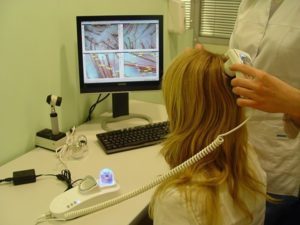
ASSESSMENT OF FIRST DISEASES
The decision whether or not to see a doctor is up to the patient depending on the severity of symptoms. However, the best solution, regardless of the location of the plaques, is to see a doctor. For the next treatment to be as successful as possible, an accurate diagnosis is required, even if the symptoms are mild.
In most cases, scalp psoriasis is diagnosed after a physical examination and historical analysis.
A dermatologist can identify scalp psoriasis by examining the pathological factors of the skin.In some exceptional cases, the patient may be advised to have a skin biopsy to rule out other diseases.
TOP TREATMENT INFLARATION
Sorry, there is currently no cure for this disease. Therapy is required throughout life and is intended to maintain remission. In addition, the care of psoriasis patients not only requires topical treatment, but is also very important for controlling existing chronic diseases and preventing new ones.
These conditions will include cardiovascular disease, metabolic disease, and psychological health.
Treatment target:
- Let the patient make a clinical recovery as soon as possible;
- The compensation must be stable and permanent;
- Maintain a patient's psychoactive state.
FOOD DIET
Traditional treatment begins with the diet. Foods containing antioxidants such as vitamins C, E, beta-carotene (vegetables, fruits, sage, ginger and others) can play a positive role, as well as omega-3 fatty acids, Found in salmon, sardines and other fish.
The link between alcohol and psoriasis is unclear, but experts say that drinkers are less responsive to treatment and that psoriasis goes into remission after quitting alcohol abuse. In addition, some anti-psoriasis drugs are not compatible with alcohol.
Observed a clearer correlation with being overweight. In obese people, as a rule, the disease progresses more rapidly with a brighter clinical picture.
SHAMPOO
Hair makes the treatment of scalp psoriasis especially difficult. Few people agree to remove their hair to more effectively address the clinical manifestations of the disease, especially considering the fact that the defects will draw more attention to others.
Conventional hair care products are not suitable in this situation, as they can irritate the scalp, contributing to the progression of the pathology. Therefore, tar shampoo is used, its effectiveness in the fight against scalp psoriasis has long been noted.
Tar has the effect of "soothing" the epidermis of the scalp, inhibiting the formation of scales. In addition, shampoos with phenolic acid are also used, as it has a keratolytic effect (destroys the dense scaly layer). Plus points are used to enhance the penetration of other drugs, including corticosteroids.
When prescribing a shampoo, a person's individual characteristics in hair hygiene are taken into account. For example, some women don't wash their hair every day, so it's best to apply the solution to their hair 2-3 times a week before bed, then wash in the morning.
PHENOLIC ACID
Phenolic acid can also be used alone in the form of an ointment. The fact that the ointment is applied for a relatively long time increases the effectiveness of its intense properties. And for patients complaining about how difficult it is to separate scales from their hair, applying ointments before bathing may help.

COAL
Coal tar resin has been used as a psoriasis treatment for several decades due to its powerful anti-proliferative, anti-inflammatory and anti-itch effects.
Although, coarse coal tar is the most effective plastic. Apply rough stone tar to the problematic scalp. Usually, it is recommended to use a turpentine solution (5-20%) formulated in the form of lotion or added to corticosteroids. This remedy helps fight psoriasis, but it has a number of side effects: staining, thinning hair, and a more serious negative effect - causing cancer, so its use is limited.
For example, for this reason coal tar is banned in Canada and the European Union.
CORTICOSTEROIDS
Out of all topical treatments, corticosteroids have been shown to be the most effective in clinical trials for scalp psoriasis and to be the most commonly prescribed treatment. Corticosteroids are also convenient in that there are a large number of production forms for any situation: creams, lotions, ointments, oils, gels, foams, solutions, sprays, and shampoos.
Do not underestimate the importance of psychological harmony in this pathology. Stress can both become a trigger, cause a detailed clinical picture, and slow down the course of treatment. Therefore, patients with internal anxiety are advised to see a psychotherapist, a psychotherapist.
RECOMMENDATIONS FOR ADVANCED HEALTH CARE
It is important for the patient with psoriasis to first follow the doctor's advice, however, by following the simple rules will be described below, you can improve the quality. amount of more life:
- Use moisturizer. The skin manifestations of the disease deteriorate markedly when the skin is dry, so it is important to keep the skin moisturized. Specialized cosmetic ointment, lotion, or, for example, regular mineral oil can help with this.
- Take good care of areas with psoriasis. When washing your hair, never remove the scales that are attached to your skin, as you can only spread the process to nearby healthy tissues.
- Be careful when trimming your nails. Cases are described when accidentally damaging the ingrown area of the nail with nail clippers, giving rise to new skin elements.
- Find the right shampoo for you without peeling your scalp so that use on your scalp doesn't go away. Or just continue to use tar, at a lower concentration, for daily care.
- Climate could also play a role. It was found that cold has an adverse effect on the patient, provoking the growth of plaques. Sunny weather causes skin symptoms to degrade, but that is not always the case.
- Use a humidifier. This can moisturize the skin and remove dry air that is not good for psoriasis patients.
- Do not take medicine that can harm your skin. Your doctor should be informed about any medications you are taking, even those you consider harmless. For example, for the treatment of depressive conditions, it is possible to use preparations containing lithium salts, which are contraindicated for patients with psoriasis.
- Avoid all types of skin damage: abrasions, cuts, bumps. Lesions on the skin can cause a condition called the Koebner phenomenon (when psoriatic factors develop along the skin lesion line). Be careful when shaving. Try to avoid acupuncture, avoid getting tattoos on your body and do whatever you can to prevent insect bites.
- Try to appear in the sun, but in moderation. Ultraviolet rays in sunlight slow down the growth of skin cells, so it is good to use UV rays in moderate doses (every 30 minutes is sufficient). The paradox is that too much exposure to the sun can cause psoriasis. Also, keep in mind that certain medications can make your skin more sensitive to UV rays.
- Patients with psoriasis should reduce their anxiety level. Of course, it's easier said than done, but you can try relaxation techniques like meditation or yoga.
- Estimate the amount of alcohol you drink. The link between alcohol and psoriasis is unclear, but scientists still believe it can aggravate symptoms, especially in men. It is well known that alcohol is very dangerous when combined with certain medications for psoriasis.
- Balance your diet and try to lose weight. If you find it difficult to do this on your own, seek help from specialists who can judge in which direction it is more effective.

RECOMMENDATIONS FOR CONTROL OF PSORIASIS SPACES ON TOP
By monitoring the progression of psoriasis, you can help the patient better control the disease and take the necessary measures on time, as well as increase the productivity of the doctor-patient relationship. A few simple rules will help you with this:
- Creates a 'self-portrait' of a psoriasis outbreak. A digital camera, smartphone or just a sheet of paper will help you with this, where you can record all the changes that happen to the arrays. It is also worth noting where the changes first occurred and in what order they increased. For such an internal examination, your doctor will just praise you and will know that you have made up your mind. Over time, analyzing the records, one can identify patterned situations, for example, an outbreak always begins with an occipital plaque.
- Whenever psoriasis progresses or progresses, try to find out what it is. Perhaps the weather has changed? Out of pill? Are you taking a new medicine? Recently damaged skin? Such agents can be individual, confusing the doctor without looking at the patient's introspection (eg,
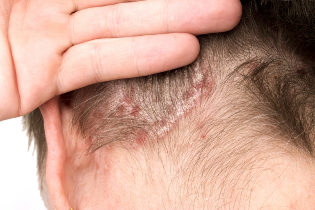 an attack that stimulates a certain coffee).
an attack that stimulates a certain coffee).
Although the disease is not transmitted through contact, but the appearance of the patient is terrifying to those who do not know. Beauty salons are afraid to provide services, some taxi drivers do not want to carry people like that, it is difficult to apply for a job. Not to mention starting a family, and the fear that their children will suffer similarly makes them unable to have children.
There have even been cases described when people with psoriasis were denied training in the Olympic swimming sanctuary due to collective complaints from other athletes. Management had to deny such people, despite the fact that they fully understood that the pathology was not dangerous in the infectious sense.
It is difficult for them to participate in daily, everyday activities because of the high psychological burden and one needing social exposure. For these reasons, societies of protection and support for psoriasis patients are forming in many countries. Companies are being deployed to educate outsiders about the disease.
People should be judged by actions, actions, not appearance. Indeed, among patients with such a pathology are highly specialized doctors, policemen, firefighters, athletes and many others, whose actions are not only their loved ones, but also the landTheir country can be proud of them.























